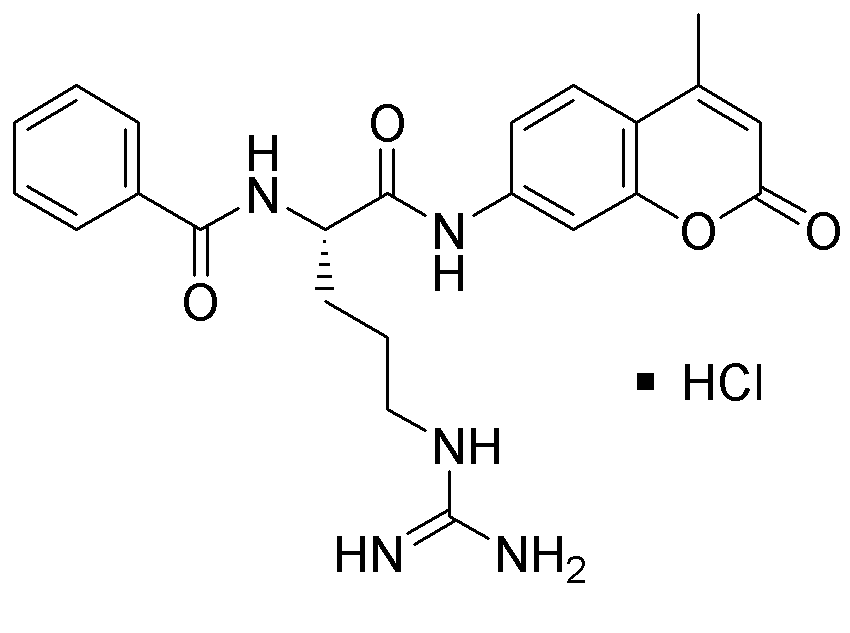Na-Benzoyl-L-arginine 7-amido-4-methylcoumarin hydrochloride is widely utilized in research focused on:
- Biochemical Assays: This compound serves as a substrate in enzyme assays, particularly for studying proteases. Its unique structure allows for specific interactions, providing clear results in enzyme activity measurements.
- Fluorescent Labeling: The fluorescent properties of this compound make it ideal for labeling biomolecules in live-cell imaging, enabling researchers to track cellular processes in real-time.
- Drug Development: Used in the development of novel therapeutic agents, it helps in screening potential drug candidates due to its ability to mimic biological substrates, facilitating the identification of effective compounds.
- Diagnostic Applications: Its specificity in biochemical reactions allows for the development of diagnostic tests, particularly in identifying protease-related diseases, enhancing early detection and treatment strategies.
- Research on Protein Interactions: This compound aids in studying protein-protein interactions, providing insights into cellular mechanisms and pathways, which is crucial for understanding disease progression and treatment options.
General Information
Properties
Safety and Regulations
Applications
Na-Benzoyl-L-arginine 7-amido-4-methylcoumarin hydrochloride is widely utilized in research focused on:
- Biochemical Assays: This compound serves as a substrate in enzyme assays, particularly for studying proteases. Its unique structure allows for specific interactions, providing clear results in enzyme activity measurements.
- Fluorescent Labeling: The fluorescent properties of this compound make it ideal for labeling biomolecules in live-cell imaging, enabling researchers to track cellular processes in real-time.
- Drug Development: Used in the development of novel therapeutic agents, it helps in screening potential drug candidates due to its ability to mimic biological substrates, facilitating the identification of effective compounds.
- Diagnostic Applications: Its specificity in biochemical reactions allows for the development of diagnostic tests, particularly in identifying protease-related diseases, enhancing early detection and treatment strategies.
- Research on Protein Interactions: This compound aids in studying protein-protein interactions, providing insights into cellular mechanisms and pathways, which is crucial for understanding disease progression and treatment options.
Documents
Safety Data Sheets (SDS)
The SDS provides comprehensive safety information on handling, storage, and disposal of the product.
Product Specification (PS)
The PS provides a comprehensive breakdown of the product’s properties, including chemical composition, physical state, purity, and storage requirements. It also details acceptable quality ranges and the product's intended applications.
Certificates of Analysis (COA)
Search for Certificates of Analysis (COA) by entering the products Lot Number. Lot and Batch Numbers can be found on a product’s label following the words ‘Lot’ or ‘Batch’.
Numéro de catalogue
Numéro de lot/série
Certificates Of Origin (COO)
This COO confirms the country where the product was manufactured, and also details the materials and components used in it and whether it is derived from natural, synthetic, or other specific sources. This certificate may be required for customs, trade, and regulatory compliance.
Numéro de catalogue
Numéro de lot/série
Safety Data Sheets (SDS)
The SDS provides comprehensive safety information on handling, storage, and disposal of the product.
DownloadProduct Specification (PS)
The PS provides a comprehensive breakdown of the product’s properties, including chemical composition, physical state, purity, and storage requirements. It also details acceptable quality ranges and the product's intended applications.
DownloadCertificates of Analysis (COA)
Search for Certificates of Analysis (COA) by entering the products Lot Number. Lot and Batch Numbers can be found on a product’s label following the words ‘Lot’ or ‘Batch’.
Numéro de catalogue
Numéro de lot/série
Certificates Of Origin (COO)
This COO confirms the country where the product was manufactured, and also details the materials and components used in it and whether it is derived from natural, synthetic, or other specific sources. This certificate may be required for customs, trade, and regulatory compliance.


